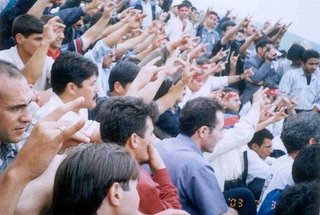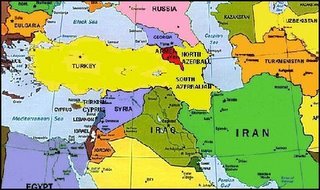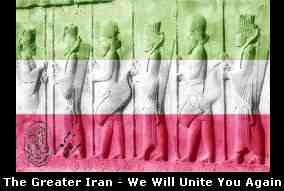Ganji must now use the international tribune to clearly outline his position about Khomeini and Political Islam
Akbar Ganji is one of the most famous deserters of the Islamic Republic of Iran. He started his political activities when he was a teenager in the Islamist milieus, with whom he worked during and after the revolution of 1979 for the repressive organs of the regime -- the Revolutionary Guards and the Ministry of Islamic Culture and Guidance.
As a functionary of the Iranian consulate in Istanbul, he was a colleague of brutal Manoocheher Mottaki, the Ahmadinejad’s foreign minister. The consulate was in this time a centre of Islamist terrorism against Iranian dissidents in Turkey.
The flagrant and notorious degree of the brutality and political failures of the IRI has contributed to grow incertitude among some self-identified as reformers. The reformers or so-called the movement of second Khordad view their mission to be the revival of Khomeini’s path. Ganji started his opposition career by approaching to these people. Later, he distanced himself from them when he realised the clique could not reform the IRI.
After being disappointed with any reform within the IRI, Ganji started his new struggles. Asan investigative journalist, he proved that the death of a few dissident was plotted by some IRI’s senior officials. Ganji had to bear a high price for his discovery -- his fabricated imprisonment was in fact the personal retaliation of these IRI’s officials, especially of the Supreme Leader, Khamenei.
His revelations about political murders were positive. They had an impact on the political consciousness of the society to better know the real face of the IRI, especially denounced by one of its ex-devotees. The ruling class of the IRI could not compel Ganji express remorse on television. He resisted any psychological pressure. Ganji was released after 6 years, though under the IRI, many thousands leftistsand Mojaheds have been immediately executed for possessing or reading an “illegal” book.
Ganji alleged that during his imprisonment, he had time to write a two parts pamphlet entitled “Manifesto for Republicanism” and smuggled them from his prison cell. It would be however difficult to imagine that as a prisoner of the brutal IRI, he could have convenient time and materials to write such intellectual writings. It seems to be more likely that his alleged Manifesto had been a reminder of his or their ideas when Ganji was working for the regime (eventually in the Ministry of Culture and Guidance). These previous ideas might have been modified, actualised and renamed as “Manifesto”.
Ganji’s pompous Manifesto, which is a big number for him, is a collection of other thinkers. It dose not separate Ganji from his Islamist past. He had better off express his own ideas about Khomeini, Political Islam and the legitimacy of any form of Islamic regime instead of borrowing ideas from other thinkers.
While Ganji boasts about the philosophy and values of human rights, his extensive quotations from Khomeini, his belief in his legitimacy and his long silence on the abominable crimes committed under and with direct order of Khomeini all remain as the little secrets of Ganji-phenomenon. These questions raise many looming questions about Ganji’s past and his political aims.
It is true that no political figure in Iran today dares challenge the regime as openly as Ganji does. Nevertheless, the secular and democratic activists have been long executed or forced to leave the country. Ganji knows that he would have been already dead, if he had been considered by the IRI a “profane” leftist or a “hypocrite” Mojahed.
For the average Iranians, who emotionally accept any protest against the hateful regime, Ganji is a hero of people. For Ganji’s brothers, who are still looking for reforms within the regime, he is too radical. They brotherly advise him that reality is too rough and unnecessary to be looked at. For people, who have the dream of having a secular and democratic Iran, expect Ganji initially break up with his Islamism and his Islamist fellows then truly give all information he knows about the all crimes of the IRI in any time. Other wise, he can keep passing his “Golden Pen” on Hajarian or on other IRI’s officials.
Ganji is an intellectual of the generation of the post-Islamists. Like any Islamist, he was long trying to ignore the discrepancy between the experience of the IRI and the realities of the societies. He finally came to the conclusion that the IRI is not reformable and called it a “Sultanate”, but Ganji’s concept from democracy and secularism remains controversial.
On his current trip, Ganji pushed recently a new courageous move; he finally condemned the prison-purge of sommer1987, but as a former functionary of the IRI, he gives no information about the culprits, collaborators, reasons and many more thousands crimes which have been systematically committed before this massacre.
Ganji must now use the international tribune to clearly outline his position about Khomeini and Political Islam. It is time that he tells the whole truth about immoral crimes of the IRI in anytime before he refers to the Immananuel Kant’s moral or boasts about the values of human rights. It will be a grateful step from his part, if he namely presents the idea, culprits and circumstances of the political crimes under the direction of Khomeini.
Ganji’s split personality characterises his phenomenon; his true face was more obvious before than today. For example:
he rejects today any violence against the IRI, but both as a revolutionary guard and a functionary of the Ministry of Islamic Culture and Guidance, he was using and theorising violence against people;
he is not today against a secular democracy, but he thinks of Khomeini as a saviour of Iran and as a guide of his thoughts;
Ganji speaks of social justice, but he is an unconditional supporter of liberalisms.
Ganji is not a product of secular and democratic movement, such a movement does not exist in Iran. Ganji-phenomenon is an inside product of any totalitarian regime
This is due to the nature of totalitarian system that can always create insider dissidents.
But for Ganji, as an offshoot of a revolution, the non-violence has another advantage. He cannot support a revolution or rebellion which is oriented to overthrow his ex-ideal state and consequently his own previous involvements. Therefore, he should look for a “velvet” or moderate political transformation in which his own past would not suddenly endanger his future. His fears from his controversial past make our ex-revolutionary guard so alien with the value of revolution that he prefers to forget that dissidents can displace or overthrow the established regime by broadly variable forms of struggle, including a revolution or even popular armed struggles.
Of course, dissidents with a revolutionary calibre are severely punished in Iran. Another hand, nobody wants bloodshed as uniquely revolutionary means. There are many models of struggles in anytime and anywhere. A categorical reject of revolution, as one of these logic models, is a reactionary dogma. The rejection is what any totalitarian regime wants too. A revolutionary opposition may more effectively challenge such a regime and the lack of it can leave the regime alone to massacre people, as it was the case under Stalin or Pol Pot. A totalitarian regime does not kill to only defend its existence; it kills also to impose its ideology and its way of life. In the case of the IRI, the totalitarian Islamic regime kills to impose its offensive Islamist ideology.
But when Ganji says “I am against revolution and view myself as a reformist”, he implicitly means that he is against his people’s revolution to topple the IRI. Ganji knows that there are different ways to win freedom, but he stresses on his pacifist ways by holding on non-violent struggles. He should tell us in which side he will ultimately stand, if the angry people march though Tehran’s streets, revolting against the IRI.
Ganji-phenomenon likes to argue that it is enough to change the present Iranian theocracy that rules. He knows that a radical change of the whole IRI carries risks for people like him. He knows that a revolutionary new regime in Iran is not against one or few Mullahs, but will sweep away all forms of Islamism.
Today, in the Iranian opposition groups abroad, the current Ganji’s tour implicitly evokes the question of his possible role in an Iranian democratic movement. As I expressed myself in my previous articles, an Iranian democratic movement of course needs the organised structures and a solid leadership to topple the IRI and open the way for a democratically elected government. All freedom-loving Iranians are welcome to support such a movement. However, such a movement is supposed to be led by a purely secular leadership. Not only must the leaders be secular in act and idea, but also in background. Therefore, a bearded deserter of the IRI like Ganji cannot dream of becoming a position in the leadership.
Furthermore, in a leadership of post-Islamic regime, there is no place for people like Hamid Karzai or a bearded Shiite PM (as in Iraq). Iranians will bring all relics of the IRI before an international courtfor their crimes or collaborations. Even if Ganji is not charged by such a court, forgiven because of his fight against some IRI’s officials, his collaboration with some other IRI’s officials will never be forgotten.
This article is not against the person of Ganji. All Iranians respect his heroic fights against some IRI’s officials. However, I cannot imagine that a bearded ex-pasdar, who still quotes from Khomeini, is enough democrat and secular to become a leading position in a secular democratic movement. It is like saying that a secular person leads an Islamic movement!
Ganji-phenomenon belongs to those dissidents whose aim is to change the government, but not the ruling class of the regime entirely. At the best, they like to impose some “harmless” changes on the established regime like a change or modification of the constitution, reducing the power or dissolving the supreme Leader“Sultan” and reforming the state institutions.
At the best, Ganji can tell all the truth about all the crimes of the IRI in anytime under any condition, but Ganji-phenomenon is a product of the IRI and does not belong to the future leadership in Iran. Comment
Original Article




.42.jpg)


